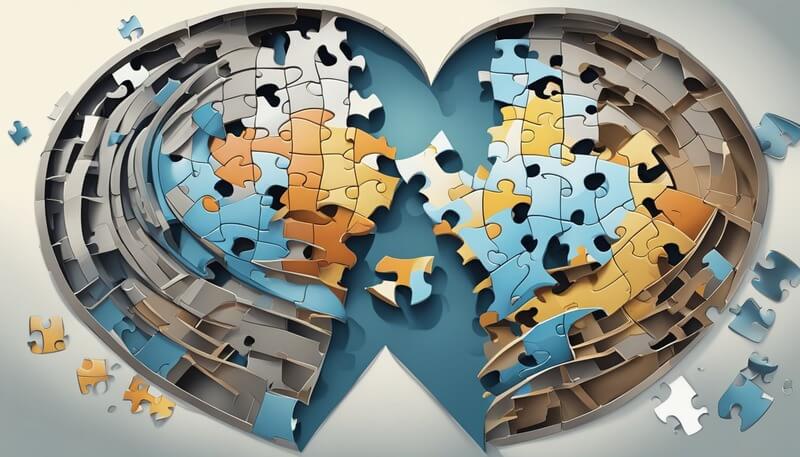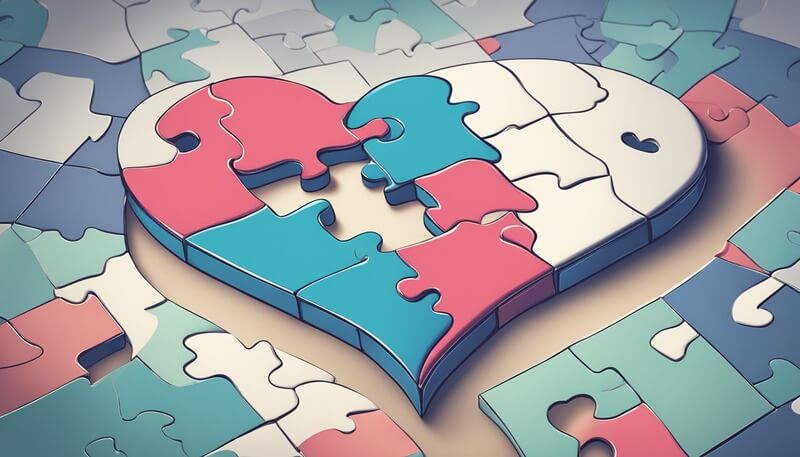Breakups can be painful, but they don’t always mean the end of a relationship. Some couples find their way back to each other after time apart. Many types of breakups, from short breaks to longer separations, can lead to reunions.
Each breakup story is unique. Some couples split due to outside factors like work or distance, while others need time to grow as individuals.
Sometimes, the time apart helps people realize what they truly want.
Getting back together after a breakup can bring new strength to a relationship. Couples often gain a fresh outlook and better communication skills. They may also have a deeper appreciation for each other after experiencing life apart.
Understanding Breakups

Breakups are complex emotional events that can deeply impact individuals. They stem from various factors and often involve psychological processes that affect how people cope and move forward.
Psychology Behind Breakups
Breakups trigger strong emotions and can shake a person’s sense of self. Many people experience grief, anger, and confusion when a relationship ends. These feelings are normal and part of the healing process.
Attachment styles play a big role in how someone handles a breakup. People with a secure attachment may cope better, while those with anxious or avoidant styles might struggle more.
Fear of being alone can make breakups harder. Some may rush into new relationships to avoid dealing with loss. Others might try to win back their ex, even if the relationship was unhealthy.
Common Reasons for Breakups
Relationships end for many reasons. Growing apart is a frequent cause. Partners may develop different interests or life goals over time.
Poor communication often leads to breakups. When couples can’t talk openly, small issues can become big problems. Trust issues, especially after cheating, can also end relationships.
External factors like job stress or family conflicts can strain partnerships. Long-distance relationships face unique challenges that may lead to separation.
Some breakups happen in the heat of the moment during big fights. These can sometimes be fixed if both people calm down and talk things out.
Circumstantial breakups occur when outside events force couples apart. This might include moves for work or school.
What are the benefits of getting back together after a breakup?

Getting back together after a breakup can lead to positive changes in a relationship. Couples often gain new insights during their time apart.
One key benefit is improved communication. Partners may learn to express themselves more clearly and listen better.
Personal growth is another advantage. The break can give each person time to work on themselves and their issues.
A renewed appreciation for each other often emerges. Couples may realize what they missed and value their partner more.
A deeper emotional connection can develop. Shared experiences and history can strengthen the bond between partners.
- Better understanding of needs
- Increased empathy
- Stronger commitment
- Enhanced problem-solving skills
Rebuilding trust is crucial. This process can lead to a more stable and secure relationship.
Taking things slow and being patient helps. It allows time to address past issues and create new, healthy patterns.
Professional help may be beneficial. A therapist can guide couples through reconciliation and teach valuable relationship skills.
12 types of breakups that get back together

Breakups can be challenging, but some couples return to each other. Different reasons and circumstances can lead to reunions after a split.
1. Friendly breakup
Friendly breakups often lead to reunions. Partners maintain respect and good communication and stay friends after splitting up.
The good feelings help them remember why they liked each other before. They can talk easily about trying again. Many couples with a friendly breakup find it simpler to restart their romance.
2. Mutual breakup
It’s called a mutual breakup when both people agree to end things. They decide together that splitting up is best. This kind of breakup is calm and understanding.
Partners often stay on good terms. They might realize later that they still want to be together, but mutual respect makes it easier to try again. Many couples who break up this way end up getting back together.
3. Temporary breakup
Some couples plan to get back together from the start. They take a break for a set time. This gives them space to work on themselves or deal with problems.
During the break, they might miss each other a lot. They often think about the good parts of their relationship. When the time is up, many are ready to try again. They come back with new ideas and energy for the relationship.
4. Resolution breakup
Couples who split to fix problems have a resolution breakup. They take time apart to work on issues. The goal is to come back stronger.
They might go to therapy or learn new skills. This can help them communicate better. When they get back together, the relationship often improves. Many find they can solve problems better after this kind of break.
5. Problem-solving breakup
In a problem-solving breakup, couples split to tackle specific issues. They focus on fixing what went wrong. This break is all about making things better.
Partners work on themselves during this time. They might learn new ways to handle conflicts. When they reunite, they often have new tools to make the relationship work. Many couples find success after taking this kind of break.
6. Personal Growth breakup
Some people break up to grow as individuals and to learn more about themselves. This is called a personal growth breakup.
During this time, they might try new things or set personal goals. They often gain confidence and clarity. When they come back together, they bring new perspectives to the relationship. Many couples find they’re stronger after growing separately.
7. Self-discovery breakup
A self-discovery breakup happens when partners need to find themselves. They take time apart to explore who they are. This can lead to a stronger reunion later.
During the break, they might travel, start new hobbies, or change careers. They learn what they want in life. When they get back together, they often have a clearer idea of what they need in a partner.
8. Forgiveness breakup
After a big fight or betrayal, some couples have a forgiveness breakup. They separate to heal and forgive. This break gives them space to deal with hurt feelings.
They might go to counseling or work on trust issues during this time. They focus on healing and moving past the problem. Many couples who take this step find they can forgive and build a stronger bond.
9. Distance breakup
Long-distance can be hard on relationships. Some couples break up because of distance but plan to reunite. This is a distance breakup.
While apart, they might focus on their own lives. They stay in touch and wait for a chance to be together again. Many couples find their bond stronger after overcoming the challenge of distance.
10. Pressure breakup
External stress can push couples apart. This leads to a pressure breakup. They might split due to work stress, family issues, or other outside forces.
During the break, they work on reducing stress in their lives. They might set boundaries with others or change their situations. Many couples get back together when the pressure eases and find their relationship is more relaxed.
11. Amicable Breakup
An amicable breakup is friendly and understanding. Both agree it’s best to end things, but they stay kind to each other.
They might keep in touch as friends. There’s no anger or hard feelings. This makes it easier to reconnect later if they want to. Many couples who have an amicable breakup find they can restart their romance smoothly.
12. Revival breakup
Some couples break up and then feel a strong urge to get back together. This is a revival breakup. They realize how much they miss and value each other.
During the break, they might see other people or focus on themselves. But they often find they still have strong feelings for their ex. Many couples who experience this kind of breakup come together with renewed passion and appreciation.
Research and studies on reconciliation after breakups

Breakup research shows that many couples do get back together after splitting up. Studies have looked at why this happens and how it affects people.
One key finding is that time apart can help couples grow. They may learn new things about themselves and each other, which can lead to a better understanding when they reunite.
Dr. Nancy Kalish, a psychology professor, has studied people who rekindled old romances. Her work found that many of these couples stayed together long-term. They often reported feeling more committed the second time around.
A 2013 study in Social Psychological and Personality Science had interesting results. It found that people who got back with an ex felt more sure about the relationship. They also saw their partner in a more positive light.
Dr. Amber Vennum‘s research focused on “cycling” relationships. These are couples who break up and get back together multiple times. Her findings showed:
- 60% of adults have been in an on-again/off-again relationship
- These relationships can be stressful
- Clear communication is key to success
Experts agree that successful reconciliations require work. Couples need to address the issues that caused the breakup. They should also set new goals for the future.
Rekindling the Relationship

Getting back together after a breakup can strengthen bonds and promote personal growth. Couples often find new ways to connect and better understand each other.
Temporary Versus Permanent Separation
Some breakups are short-term, while others seem final. Temporary breakups can give couples space to think and grow. They might realize they want to be together after all.
This time apart can help fix problems and make the relationship stronger.
Permanent breakups are harder to come back from. But it’s not impossible. If both people still have feelings, they might try again. They need to work on what went wrong before. This takes time and effort from both sides.
The Role of Professional Help
Talkspace TherapyFeatured
#1 Rated Online Therapy, 1 Million+ Users
What you’ll get from the therapy
- Identify the issues
- Restore trust
- Rediscover strengths
- Empathy and resolution
- Ongoing support
Seeking help from a therapist can be a big step in getting back together. A pro can help couples talk better and solve problems. They give tools to make the relationship work.
Therapy isn’t just for fixing things. It can make a good relationship even better. Couples learn new ways to support each other and avoid old mistakes.
The ‘One That Got Away’ Phenomenon
Sometimes, people break up but can’t stop thinking about their ex. This is the “one that got away” feeling, which happens when someone realizes what they lost.
These couples might get back together years later. They’ve grown and changed, and now they’re ready to make it work. This kind of reunion can be very strong. Both people know what they want and value each other more.
Frequently Asked Questions
Breakups can be complex, with many factors influencing whether couples reunite. The path to reconciliation often involves specific signs, timelines, and steps.
1. What signs indicate a possibility of reconciliation after a breakup?
Signs of potential reconciliation include ongoing communication, expressions of regret, and positive interactions. On-again, off-again couples may show patterns of repeated breakups and reunions.
Mutual friends might report that an ex still talks about their former partner. Both individuals may also work on personal growth and addressing issues that led to the breakup.
2. How do you know if a breakup is temporary?
Temporary breakups often involve external factors like career demands or long-distance moves. Couples may express a desire to reunite when circumstances change.
Continued emotional connection and unresolved feelings can indicate a temporary split. Both parties might also avoid dating others or making major life changes.
3. What is the typical timeframe for couples to reconcile post-breakup?
Reconciliation timelines vary widely among couples. Some may reunite within weeks, while others take months or even years.
The average reconciliation period is 3-6 months. This time allows for reflection, personal growth, and perspective on the relationship.
4. How does psychology interpret different breakup types concerning potential reunions?
Psychology views breakups through various lenses, including attachment styles and relationship patterns. Uncertain breakups may stem from unresolved doubts or fears.
Breakups due to miscommunication or lack of connection are often seen as more fixable than serious trust issues or incompatibility.
5. Is it normal for couples to break up and get back together?
Yes, it is common for couples to experience breakups and reconciliations. Many relationships go through challenging periods that lead to temporary separations.
This pattern is especially prevalent in younger couples or those in long-term relationships facing significant life changes.
6. What percentage of breakups get back together?
Studies suggest that about 50% of couples who break up give their relationship another chance. The success rate of these reconciliations varies.
Factors influencing reunion rates include the reasons for the initial breakup, the length of the relationship, and personal growth during the separation.
7. What steps increase the chances of a successful reconciliation after a breakup?
Self-reflection is crucial. Both partners should examine their role in the breakup and work on personal growth.
Open communication about past issues and future expectations is essential. Setting new boundaries and relationship goals can help establish a stronger foundation.
Professional counseling or therapy can provide tools for better communication and problem-solving. Taking things slowly and rebuilding trust gradually often leads to more successful reconciliations.









